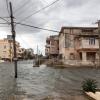
IIASA researchers used a new method to analyze the effectiveness of the Caribbean Catastrophe Risk Insurance Facility (CCRIF) with regard to its ability to minimize the short-term fiscal effects of disasters.
In a world characterized by the increasing frequency and severity of disasters due to climate change, fiscal resilience is vital to ensuring efficient recovery. Traditional approaches of identifying the best management options to improve fiscal resilience are typically based on the analysis of probabilistic information about possible disasters that could happen in the future.
IIASA scientists conducted a study focusing on the Caribbean using a novel method called Climate Storylines. This method produces different scenarios of past plausible events and investigates the usefulness of different measures under those scenarios. Among the major advantages of this approach is its ability to assess the impact of a past disaster under different future climate and socioeconomic settings.
The findings show that fiscal effects due to natural hazard events can be significant for Caribbean countries, and there are indications that insurance can help to mitigate them. The study analyzed the effectiveness of CCRIF, a regional catastrophe fund for local governments, designed to limit the financial impact of hurricanes and earthquakes by quickly providing financial liquidity.
The authors deduced that the effects of hurricane strikes could have been considerably more damaging if the facility had not been operational, highlighting that CCRIF can counteract the negative short-term fiscal consequences induced by a disaster.
Further info:
Hochrainer-Stigler, S., Zhu, Q., Ciullo, A., Peisker, J. , & Van den Hurk, B. (2023). Differential Fiscal Performances of Plausible Disaster Events: A Storyline Approach for the Caribbean and Central American Governments under CCRIF. Economics of Disasters and Climate Change 10.1007/s41885-023-00126-0.
